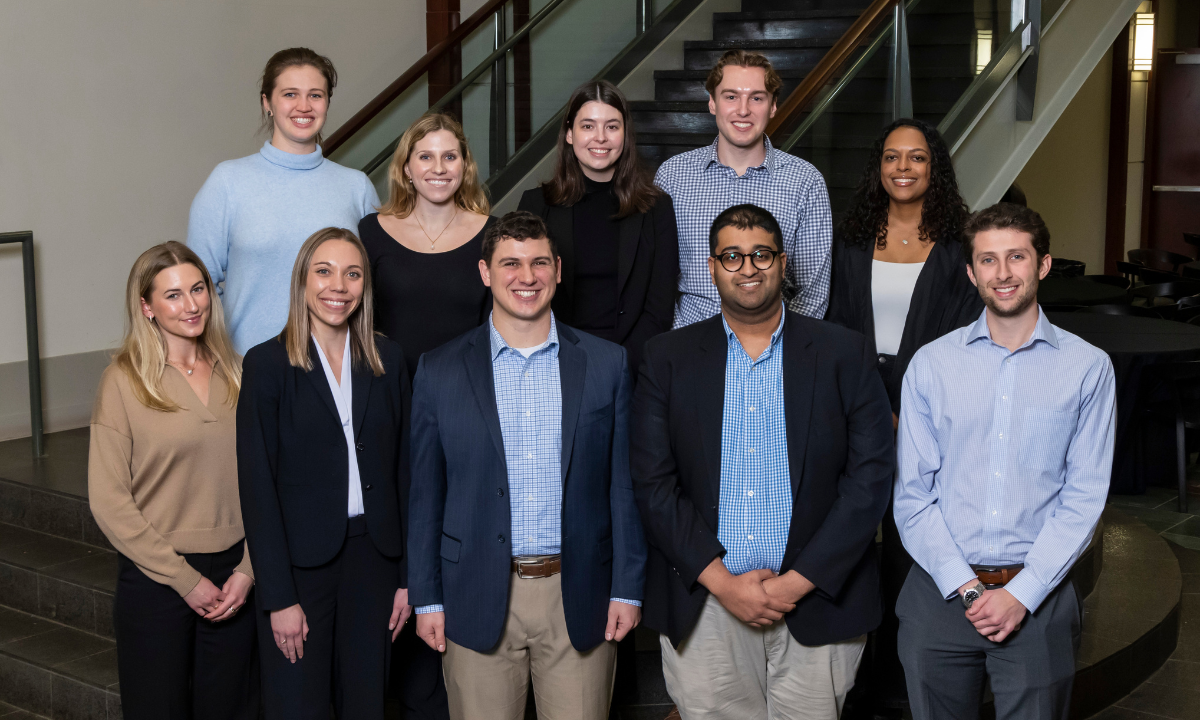This spring, four Vanderbilt Law Students authored Public Grocery Stores: A Guide for Policymakers. Using case studies from stores around the country, the paper sheds light on the benefits and drawbacks of public grocery store models, offering guidance and a model bill for policymakers and leaders considering their use in urban or rural communities. The guide is the first published paper to come out of the Political Economy and Regulation Policy Lab, a new course offered at Vanderbilt Law School, and was published by the Vanderbilt Policy Accelerator for Political Economy and Regulation (VPA).
Authors Taylor Lawing ‘24, Yesenia Jimenez ‘24, Jon McNeal ‘25, and Raghav Gupta ’24 researched and drafted the paper during the fall of 2023 under the guidance of VPA Director Ganesh Sitaraman, who holds the New York Alumni Chancellor’s Chair in Law “Our prompt was to research public grocery stores across the country,” said Lawing. “There were not many of these stores, but those in operation provided the foundation for our research. We used that research to determine if the implementation of a public grocery store was a viable approach to combat food deserts and food insecurity in urban and rural communities.”
The paper was partly inspired by the Illinois Grocery Initiative Act, passed in summer 2023, which will invest $20 million to help maintain and establish grocery stores in “food deserts,” areas with limited access to fresh foods. “We found that there was a lot of room for creativity in how these bills are applied,” said Gupta. “The Illinois bill is written very broadly. It’s not only about having to open supermarkets in these places, but also about how we can best serve the community.”
Through the semester-long course, the students researched their respective sections of the paper; Sitaraman offered guidance and feedback each week. “It was a really great opportunity to experience a different style of law school class, where the outside research impacted in-class discussions each week, with a focus on policy implications rather than caselaw,” Lawing noted. Their research included interviews with operators of public grocery stores in Boston, MA; Baldwin, FL; and Winston-Salem, NC; along with associated individuals and organizations. “One thing I noticed in our case studies was that oftentimes grocers can feel like they’re the only ones doing something,” said Jimenez, “but our paper also shows that there’s a network of people doing this kind of work, who are passionate about addressing food access and food insecurity.”
The paper, published by the Vanderbilt Policy Accelerator (VPA) in March, begins with introduction to the significance and causes of Food Deserts, followed by an overview of solutions. It continues with a series of case studies detailing different public options – Publicly-Owned, Non-Profit, Public-Private Partnership, and Cooperative stores – and a guide for building stores. The Appendices offer a checklist for launching a store and a model bill for policymakers.
“I think a lot of folks come to law school with a desire to effect some positive change in the world,” said McNeil. “But the reality is, in that both law school and law as a practice, those opportunities might not come as readily as people might think. I think it was really cool to work on a project that would directly have a positive impact on many people.”
Jimenez noted the difference between the clinic experience and the Policy Lab – “they build two very different skill sets. Something I was looking for in the lab was how to address situations that don’t necessarily have a solution in the courtroom, and food deserts was one of them.”
“I think a lot of people, when they think of experiential education in law school, think of clinical work. I found the policy lab was another great way to teach my brain something new,” Gupta said.
“I’m proud of the way the students embraced this opportunity to conduct in-depth research and develop proposals with immediate, real world applications,” said VPA Director Sitaraman. “Their work is impressive and important, and I look forward to seeing how they carry forward the skills and insights they’ve developed into their future endeavors.”
VPA is part of Discovery Vanderbilt, a groundbreaking initiative to bolster innovative research and education at Vanderbilt. VPA focuses on cutting-edge topics in political economy and regulation to swiftly bring research, education, and policy proposals from infancy to maturity at a pace that aligns with the urgency of today’s challenges.


